

First Orbit - the movie. World War II: Behind Closed Doors. This a documentary film on the role of Joseph Stalin during World War II.
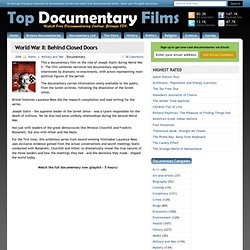
The film combines narrative-led documentary segments, interwoven by dramatic re-enactments, with actors representing main political figures of the period. The documentary carries information newly available to the public, from the Soviet archives, following the dissolution of the Soviet Union. British historian Laurence Rees did the research compilation and lead writing for the series.
History - Europe - France. Anglo-Saxons. The Anglo-Saxons were a people who inhabited Great Britain from the 5th century.
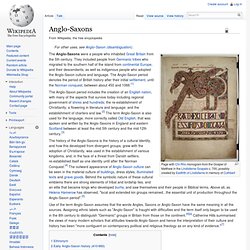
History of Ireland. History of Switzerland. Since 1848, the Swiss Confederation has been a federal state of relatively autonomous cantons, some of which have a history of confederacy that goes back more than 700 years, arguably putting them among the world's oldest surviving republics.
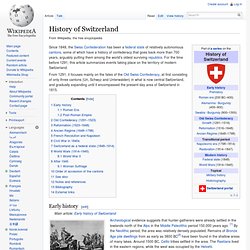
For the time before 1291, this article summarizes events taking place on the territory of modern Switzerland. From 1291, it focuses mainly on the fates of the Old Swiss Confederacy, at first consisting of only three cantons (Uri, Schwyz and Unterwalden) in what is now central Switzerland, and gradually expanding until it encompassed the present-day area of Switzerland in 1815. Early history[edit] History of England. History of Portugal. Signs of military decline began with two disastrous battles: the Battle of Alcácer Quibir in Morocco in 1578 and Spain's abortive attempt to conquer England in 1588 - Portugal was then in a dynastic union with Spain, and contributed ships to the Spanish invasion fleet.
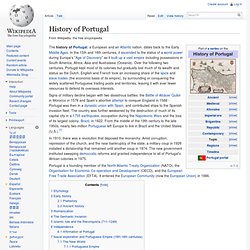
Roman Republic. The Roman Republic (Latin: Res Pvblica Romana) was the period of the ancient Roman civilization when the government operated as a republic.
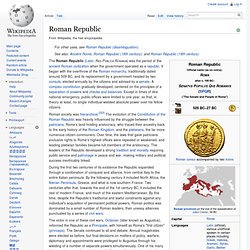
It began with the overthrow of the Roman monarchy, traditionally dated around 509 BC, and its replacement by a government headed by two consuls, elected annually by the citizens and advised by a senate. A complex constitution gradually developed, centered on the principles of a separation of powers and checks and balances. Except in times of dire national emergency, public offices were limited to one year, so that, in theory at least, no single individual wielded absolute power over his fellow citizens. Religion in ancient Rome. The religion of Ancient Rome was polytheistic in origin, in line with religious traditions in wider Iron Age Europe.
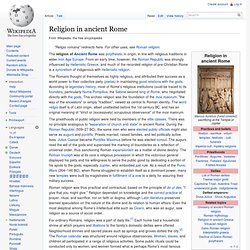
From an early time, however, the Roman Republic was strongly influenced by Hellenistic Greece, and much of the recorded religion of pre-Christian Rome is a syncretism of indigenous with Hellenistic religion. Roman religion was thus practical and contractual, based on the principle of do ut des, "I give that you might give. " Religion depended on knowledge and the correct practice of prayer, ritual, and sacrifice, not on faith or dogma, although Latin literature preserves learned speculation on the nature of the divine and its relation to human affairs. Even the most skeptical among Rome's intellectual elite such as Cicero, who was an augur, saw religion as a source of social order.
For ordinary Romans, religion was a part of daily life.[1] Each home had a household shrine at which prayers and libations to the family's domestic deities were offered. UNRV History - Roman Empire. Tacitus. Tacitus is considered to be one of the greatest Roman historians.[1][2] He lived in what has been called the Silver Age of Latin literature.
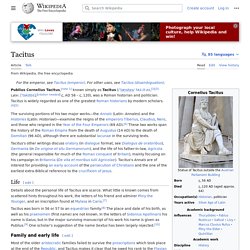
He is known for the brevity and compactness of his Latin prose, as well as for his penetrating insights into the psychology of power politics. Life[edit] Details about his personal life are scarce. What little is known comes from scattered hints throughout his work, the letters of his friend and admirer Pliny the Younger, and an inscription found at Mylasa in Caria.[3] Family and early life[edit] Although the province of his birth is unknown (and has been variously conjectured as Gallia Belgica, Gallia Narbonensis, or northern Italy)[10] his marriage to the daughter of the Narbonensian senator Gnaeus Julius Agricola implies that he came from Gallia Narbonensis.
His ancestry, his skill in oratory, and his sympathetic depiction of barbarians who resisted Roman rule (e.g., Ann. 2.9), have led some to suggest that he was a Celt. Works[edit] Ancient Rome: The Rise and Fall of an Empire. Ancient Rome: The Rise and Fall of an Empire is a BBC One docudrama series, with each episode looking at a different key turning point in the history of the Roman Empire.
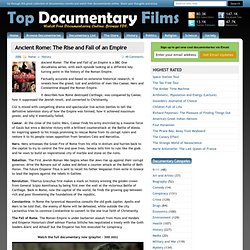
Factually accurate and based on extensive historical research, it reveals how the greed, lust and ambition of men like Caesar, Nero and Constantine shaped the Roman Empire. It describes how Rome destroyed Carthage, was conquered by Caesar, how it suppressed the Jewish revolt, and converted to Christianity. CGI is mixed with compelling drama and spectacular live-action battles to tell the definitive television story of how the Empire was formed, how it achieved maximum power, and why it eventually failed. Caesar. History of Greece. The history of Greece encompasses the history of the territory of the modern state of Greece, as well as that of the Greek people and the areas they ruled historically.
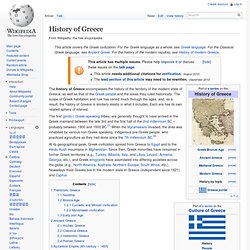
The scope of Greek habitation and rule has varied much through the ages, and, as a result, the history of Greece is similarly elastic in what it includes. Each era has its own related sphere of interest. The first (proto-) Greek-speaking tribes, are generally thought to have arrived in the Greek mainland between the late 3rd and the first half of the 2nd millennium BC – probably between 1900 and 1600 BC. When the Mycenaeans invaded, the area was inhabited by various non-Greek-speaking, indigenous pre-Greek people, who practiced agriculture as they had done since the 7th millennium BC. Prehistoric Greece[edit] Thucydides. Thucydides (/θjuːˈsɪdɨdiːz/; Greek: Θουκυδίδης, Thoukudídēs; c. 460 – c. 395 BC) was an Athenian historian, political philosopher and general.
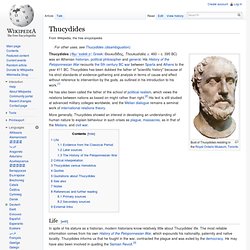
His History of the Peloponnesian War recounts the 5th century BC war between Sparta and Athens to the year 411 BC. Thucydides has been dubbed the father of "scientific history" because of his strict standards of evidence-gathering and analysis in terms of cause and effect without reference to intervention by the gods, as outlined in his introduction to his work.[1] He has also been called the father of the school of political realism, which views the relations between nations as based on might rather than right.[2] His text is still studied at advanced military colleges worldwide, and the Melian dialogue remains a seminal work of international relations theory.
Life[edit] In spite of his stature as a historian, modern historians know relatively little about Thucydides' life. Evidence from the Classical Period[edit] Later sources[edit] Pericles. Genius - Pythagoras 1 of 5. Aristotle's Lagoon (1/4) Alexander the Great. During his youth, Alexander was tutored by the philosopher Aristotle until the age of 16. When he succeeded his father to the throne in 336 BC, after Philip was assassinated, Alexander inherited a strong kingdom and an experienced army.
He had been awarded the generalship of Greece and used this authority to launch his father's military expansion plans. In 334 BC, he invaded the Achaemenid empire, ruled Asia Minor, and began a series of campaigns that lasted ten years. Alexander The Great and the Macedonian army. The Greeks - Crucible of Civilization, Part 1 of 10.mp4. History of Europe. The history of Europe covers the people inhabiting the European continent since it was first populated in prehistoric times to the present. The first Homo sapiens arrived between 45,000 and 25,000 BC. The earliest settlers to Prehistoric Europe came during the paleolithic era.
The adoption of agriculture around 7000 BC ushered in the neolithic age. Neolithic Europe lasted for 4000 years, overlapping with metal-using cultures that gradually spread throughout the continent. Byzantine Empire. The Byzantine Empire, alternatively known as the Eastern Roman Empire, was the predominantly Greek-speaking eastern half continuation and remainder of the Roman Empire during Late Antiquity and the Middle Ages. Its capital city was Constantinople (modern-day Istanbul), originally founded as Byzantium. It survived the fragmentation and fall of the Western Roman Empire in the 5th century AD and continued to exist for an additional thousand years until it fell to the Ottoman Turks in 1453. During most of its existence, the empire was the most powerful economic, cultural, and military force in Europe. Both "Byzantine Empire" and "Eastern Roman Empire" are historiographical terms created after the end of the realm; its citizens continued to refer to their empire as the Roman Empire (Ancient Greek: Βασιλεία Ῥωμαίων, tr.
Basileia Rhōmaiōn; Latin: Imperium Romanum), or Romania (Ῥωμανία), and to themselves as "Romans".